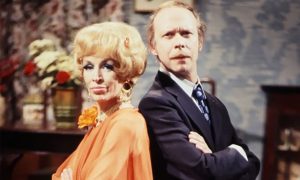
There are certain words, the use (or overuse) of which I’m finding increasingly unacceptable – ‘unacceptable’ being a prime example. A bruised banana from the market stall is unacceptable because you can give it back. Most things that get described as unacceptable these days are not rejectable.
Take Liverpool’s performance against Real Madrid (5-2 defeat at home, in case you missed it). I heard that described numerous times as ‘unacceptable’ but tough, it’s done, you can’t reject it. ‘Appalling’ would be a more appropriate word, ‘catastrophic’ even, ‘hilarious’ if you like… something that describes a reaction, not a transaction.
Anyway, I was looking for something to prop my eyes open watching City the following night – a propper, you might think, but no, that wouldn’t be the proper word for something that props, would it? A thing that props is called a prop, presumably to avoid confusing it with the word proper. So why, you might ask, is ‘proper’ spelt as if it should rhyme with George and Mildred Roper?
The answer, as with so many of life’s peculiarities, lies with the French. Their adjective ‘propre’, which can mean ‘clean’ or ‘own’, crossed the Channel some time around 1300 with its short ‘o’ sound and, like bechamel sauce, it stuck. For the next 700 years ‘proper’ enjoyed a fairly simple life, being used to mean a variety of things all stemming from the original Latin meaning of ‘one’s own’.
That sense of belonging to one specific purpose led to wider definitions such as fitting, apt, neat, genuine, and you can see why the French used it to mean clean. The ‘proper’ family expanded to give us words like property, impropriety and appropriate. ‘Properly’, meaning ‘exceedingly’, appeared in the 15th century but was later considered vulgar and dropped from society in the 19th.
Today, though, it’s back. Every so often a word that has languished in the shadows, sweeping the hearth and scrubbing the floors for years, gets a makeover from some fairy godmother and suddenly it’s the belle of the vernacular ball. So it was with ‘proper’ about 20 years ago.
Until the turn of the millennium, ‘proper’ led a decidedly unglamorous life: we used it to define something genuine, we learned about proper nouns at school and occasionally someone would use the old-fashioned idiom ‘right and proper’ while thumbing their braces and doing the Lambeth walk.
But then, one starry night, proper was given a new position in the English language and it’s never looked back. “He’s proper daft.” “It was proper funny.” Grammatical purists gnashed their teeth but had to admit that this truncated adverb brought something new to the lingo, something we’d been missing since the 19th century.
Here was a word that let you express ‘exceedingly’ without actually saying ‘exceedingly’ and sounding like King Charles III, or using the expletive Anglo-Saxon alternative and getting banned from prime time TV. Here was a word that went beyond ‘very’, ‘so’, ‘extremely’, ‘incredibly’, ‘terribly’ and all the other adverbs that had tried on the glass slipper and found it too tight.
So proper became the new properly. Fair enough. That’s the natural evolution of language. What’s harder to stomach is the overuse of its cousin ‘appropriate’. These days every one of society’s sins, from singing Tom Jones songs at the Principality Stadium to child molestation, is described as ‘inappropriate’. Surely we should use different adjectives for such a wide spectrum of transgressions. Belching in a library is ‘inappropriate’, sexual predation is somewhat more damaging, isn’t it?
So here’s my plea to the English speaking world: can we be more sparing in our use of ‘acceptable’ and ‘appropriate’? After all, it’s only right and proper.


